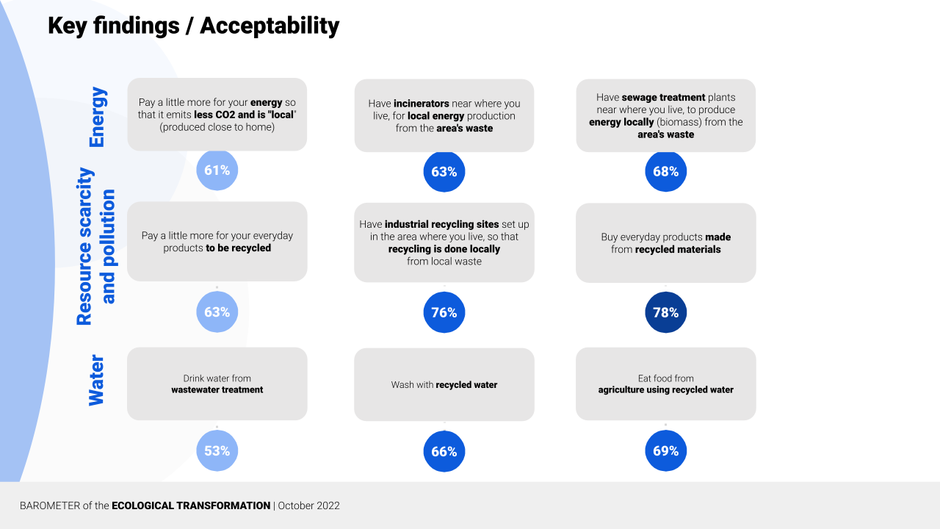Veolia and Elabe present the first global opinion survey on the ecological transformation
Published on by Water Network Research, Official research team of The Water Network in Business
"Are we ready to accept the changes needed to address the environmental emergency?"
To answer this question, Veolia, the global leader in environmental services, and Elabe, French research and consulting firm, have launched the first barometer of the ecological transformation. This first-of-a-kind global opinion survey assesses the level of acceptability of ecological solutions and analyzes the obstacles and levers for action to accelerate the transformation.
With a sample covering more than half of the world's population on all five continents, this barometer reveals unprecedented results : although the reality of climate change is uncontested, the path to be taken to mitigate it is still difficult to imagine according to the survey respondents. The majority of respondents from 25 different countries said they were ready to go further under a number of conditions.
Main findings at the global level
67% of the world’s inhabitants are certain that the costs of the consequences of climate change and pollution will be greater than the investments needed for the ecological transformation.
60% of the world’s inhabitants are ready to accept most of the changes (economic, cultural, social) that the massive deployment of ecological solutions would require. But with clear conditions: no health risks, a fair distribution of the effort and the proven usefulness of the solution.
56% of the world’s inhabitants believe that the solutions to mitigate pollution and climate change are not sufficiently talked about.
Across many topics covered in the barometer, a clear consensus is emerging towards the green solutions that were tested and a strong level of acceptance of the changes required to implement them (whether for initiatives related to energy, resource protection or water).
Key points on the social acceptability of ecological solutions worldwide

For Estelle Brachlianoff, CEO of Veolia
“This first-of-a-kind study highlights the obstacles and levers of social and economic acceptability of the ecological solutions wide scale deployment. The results are clear: awareness of climate issues is widely shared and people around the world are convinced that the cost of inaction will actually be higher than the cost of action. They want to learn more about the existing solutions and are in favor of their large-scale deployment, provided that they are fair and effective. These encouraging results give us a great sense of responsibility and commitment from each of the parties: companies, public authorities and citizens, to mobilize and accelerate the ecology of solutions. It is therefore no longer possible to put off until tomorrow the decisions that must be taken today
For Bernard Sananès, President of research and consulting firm Elabe
« The first barometer of ecological transformation shows that the world's public opinion is convinced that we are currently experiencing the end of a world, but not the end of the world. Far from giving up in the face of the climate and ecological emergency, it urges people to take action and believe that we have more to gain than to lose by making the ecological transformation. While solutions to reduce our ecological impact are still little debated, this study helps us understand the conditions of their acceptability in order to accelerate the ecological transformation. »
About the methodology
The survey was conducted in 25 countries in 5 continents with more than 25,000 individuals (about 1,000 per country). Countries were chosen for their demographic weight, their impact in terms of GHG emissions and to ensure a diversity of political and cultural ecological histories. Overall, these countries represent nearly 60% of the world's population and 68% of global GHG emissions. A survey conducted online from August 24 to September 26, 2022. For each of the 25 countries, a representative sample of residents aged 18 and over was selected. Frequency : Every 18 months (long period of evolution of representations, opinions and behaviors).
Taxonomy
- Ecological Sanitation
- Ecology
- Ecological Design